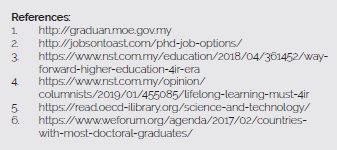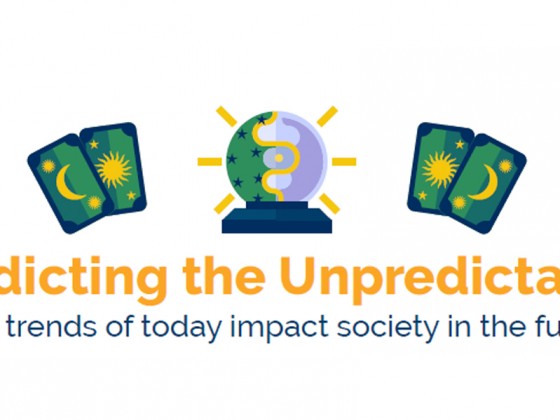by | Norsam Tasli bin Mohd Razali, norsamtasli@might.org.my | Nur Amira Muhammad, amira@might.org.my
Education is the most powerful weapon which you can use to change the world
– Nelson Mandela
As the quote implies, education is the key to change people’s lives and further economic growth. In essence, education holds the power to change people’s minds and empower their behaviour. Taken together, this works to create a better community that can collectively contribute positively to a country’s socioeconomic growth.
Therefore, it is important for any country to provide the best education support to develop its economy. A pool of highly skilled and educated people is pivotal to achieve robust economic growth.
Currently, the world is ushering in the era of the fourth industrial revolution (4IR). This revolution has changed the whole socioeconomic ecosystem on its head and now demands more dynamic skillsets from today’s human capital. For instance, Japan has thoroughly defined what the change would mean to its people. In anticipation of global trends, Japan has outlined a plan toward society 5.0 to take full advantage of what current and future technologies have to offer to become a super smart society.
Meanwhile, for Malaysia, the 4IR has been translated into joint-efforts centred on framing Malaysia’s higher education 4.0 framework. This framework aims to deliver high-quality tertiary education in order to produce quality
graduates and promote a prosperous economy.
Toward this end, government actors are playing a key role to create a conducive educational environment to encourage creativity and innovation specifically on research and development (R&D). The level of R&D; one of the indicators of a country’s innovativeness, can help to promote broad-ranging collaborative efforts between higher learning institutions and the industry. In what can be considered a sign of things to come, this will further stoke demand for academic experts who hold Ph.D. qualifications.
Alongside 4IR influence and the importance of R&D, will open up plentiful opportunities for industry experts and thereby, Malaysians are highly encouraged to take another look at education in view of long-term career development.
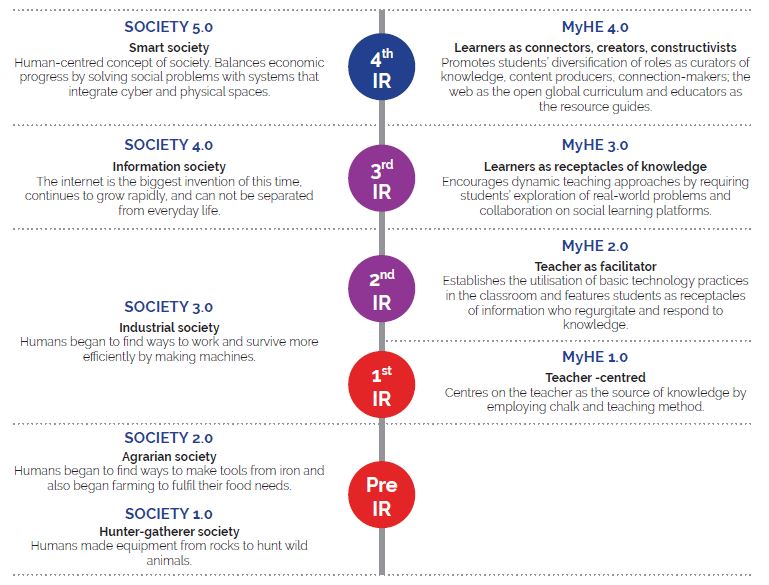
Uplifting Malaysia’s human resources
Malaysia aims to have 60,000 PhD candidates by 2023. For the past 10 years, Malaysia has recorded a 20% rise in the number of PhD holders. This growing trend indicates that the target is indeed achievable. In 2017 alone, Malaysia’s PhD holders’ cumulative count was approximately around 32,828 candidates.
The figure reflects the government’s return on investment in human capital development through scholarships and aids. Largely, these instruments have successfully encouraged more Malaysians to take their academic qualification a step further. It is hoped that this measure will help lift the country’s human capital development to boost the economy.
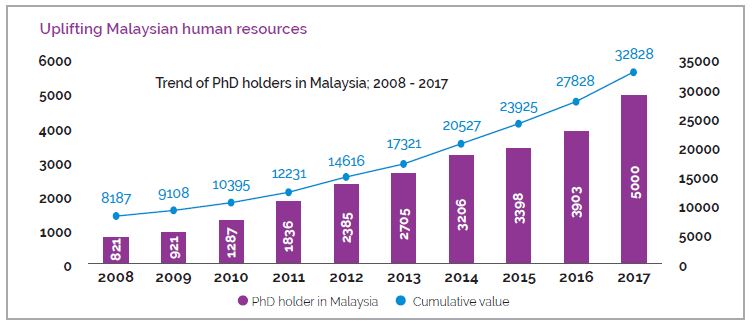
Raising the career development
There are a lot of reasons why people choose to further study. A simple survey was recently conducted to find out
what the reasons are. The idea was to gather collective reasons as to what encouraged PhD candidates to further their studies. Consequently, four main reasons came out on top; career development, work-related knowledge, personal attributes, and encouragement from friends and families. Each scored 64%, 53%, 35%, and 17%, respectively.
The highest score represented working candidates who turned to education to further their career development and gain more knowledge or to become experts in their fields. Hence, these PhD candidates appear to have better career opportunities and mobility with their PhD titles. For instance, in terms of monthly salaries, PhD holders are paid higher compared to masters and degree holders. The study showed that 88% of PhD holders take home monthly salaries of more than RM3,000 a month. In addition, the statistics reported by MOE stated that from 2013 to 2018, on average, 94% of PhD holders were employed as permanent employees.
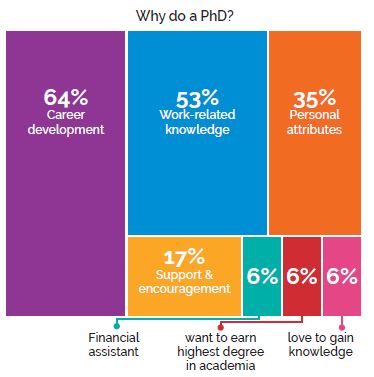
This figure shows the government investment on human capital development especially through scholarship help to encourage Malaysian to further their academic level and indirectly uplift the human resource skill to improve the national economy.
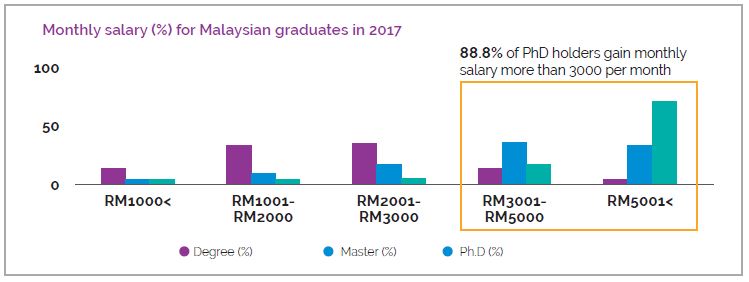
Widening career options and opportunities
Given that the advantage of having a PhD opens up more opportunities for PhD holders, they can either pursue an academic or industry career. The options are getting wider because PhD holders are now considered experts
in their fields. In addition, they are also viewed as wellrounded candidates who possess good interpersonal skills gained throughout the process of completing their PhD studies.
Below are some examples of career options for PhD holders:
Academic line
Candidates can develop a career within the higher education sector for posts such as lecturers or researchers. Candidates can also specialise in a subject matter or a body of knowledge that differs from their core academic disciplines.
Research, publishing and consultancy
Candidates can apply for posts such as lab researchers for public or private organisations that carry out research in their fields.
Professional
Candidates can choose to venture out of their study fields and apply for project management roles at private companies. They can put their industry knowledge to good use to manage technology projects to push new
innovative products and services out faster. For history and literature candidates however, interpersonal skills such as articulacy will be counted upon.
Others
Other options available for candidates to choose from for post-doctorate levels are research and publishing fields. On the contrary, candidates can opt to pursue their own entrepreneurial ideas by developing products and services that relate to their expertise.
Conclusion
Clearly, pursuing a PhD can help map out a plan to connect Malaysia’s talent pool with the best opportunities in the future. Firstly, the socioeconomic ecosystem is undergoing a major change as a result of advances in 4IR technologies. Against this backdrop, the government is offering a host of incentives to encourage more Malaysians to pursue PhD education in order to support the country’s future economic growth. Secondly, opportunities for career development are wider for those who are already working across various sectors and last but not least, PhD qualifications offer broader career opportunities for holders. With this question out of the way, perhaps the next logical question that begs asking is, “Do I have the self-discipline to complete my PhD study?” The outlook for PhD holders is decidedly promising. Evidently, it is opening up new strategic choices of competing in the job market.
